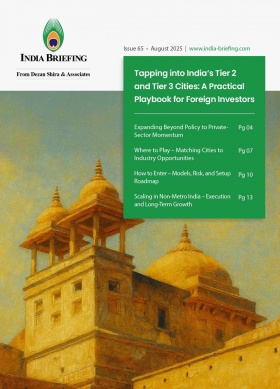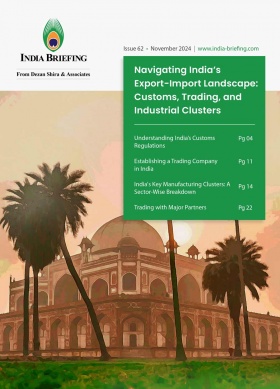Registering a Pharmaceutical Company in India: How to Obtain CDSCO & Drug License Approvals
In 2025, India’s pharmaceutical sector continues its ascent, uplifted by record export levels and sustained foreign investment. In addition, regulatory updates—notably the enhanced official website for CDSCO filings and full adoption of the ONDLS platform by state authorities—have markedly improved transparency and speed in the licensing process.
India has emerged as one of the world’s largest producers and exporters of generic medicines, with a Bain & Company report projecting pharmaceutical exports to grow 10–15 times and reach nearly INR 29 trillion (US$328.5 billion) by 2047. This growth is being driven by the latest regulatory reforms and digitization.
Registering a pharmaceutical company in India, however, requires careful planning and compliance with both national and state-level regulations. The Central Drugs Standard Control Organization (CDSCO) acts as the national authority, overseeing approvals for new drugs, clinical trials, manufacturing licenses, and imports. At the state level, drug administrations manage manufacturing, wholesale, retail, and loan licenses through the Online National Drugs Licensing System (ONDLS).
In this guide, we provide a step-by-step overview of incorporation, CDSCO and state-level approvals, key documents, validity periods, and renewal timelines.
Regulatory developments on establishing a pharma company in India
To support India’s expanding pharmaceutical industry, regulators have strengthened digital infrastructure. At the national level, the CDSCO’s SUGAM portal now offers real-time tooltips, streamlined workflows for clinical trial applications in biologicals, and an auto-approval mechanism if queries remain unresolved within 30 days—enhancing efficiency and predictability for applicants.
At the state level, the ONDLS has been made mandatory for all applications, including WHO-Good Manufacturing Practices (GMP) and Certificate of Pharmaceutical Product (COPP) requests. By replacing manual submissions, the system minimizes delays, standardizes processes, and creates a unified database accessible by both state Food and Drug Administrations (FDAs) and the CDSCO.
Together, these updates mean that compliance in India’s pharmaceutical sector requires readiness to navigate two distinct but increasingly integrated digital platforms.
The SUGAM portal is CDSCO’s online system for drug and medical device approvals, registrations, and licenses. It streamlines applications for new drugs, clinical trials, imports, and manufacturing, offering real-time guidance, status tracking, and faster processing through features like auto-approval.
Incorporating and establishing presence in India
The first step for a pharmaceutical company entering India is to establish a recognized business entity. Investors typically choose among three structures:
- A private limited company, which offers limited liability and greater credibility with regulators;
- A limited liability partnership (LLP), suited for smaller operations; or
- A wholly owned subsidiary, commonly used by multinational companies seeking full control of their Indian operations.
The incorporation process, conducted through the Ministry of Corporate Affairs’ MCA21 portal, requires reserving a company name, drafting the constitutional documents, and obtaining Director Identification Numbers (DINs) and Digital Signature Certificates (DSCs).
Once incorporated, the business must register for a Permanent Account Number (PAN), Tax Deduction and Collection Account Number (TAN), and Goods and Services Tax (GST). If imports or exports are planned, an Import-Export Code (IEC) is mandatory.
For pharmaceutical businesses, an additional and critical step follows, i.e., appointing an Authorized Indian Representative (AIR) or Marketing Authorization Holder (MAH). This entity or individual must be licensed under the Drugs and Cosmetics Act, 1940, and is responsible for all regulatory submissions to CDSCO. Foreign manufacturers cannot apply directly and must act through a registered Indian agent, who creates and manages their profile on the SUGAM portal.
ALSO READ: Private Limited vs LLP vs OPC in India: Complete Guide for Foreign Investors
Navigating CDSCO product and manufacturing approvals
The CDSCO is India’s national regulatory authority, operating under the Directorate General of Health Services in the Ministry of Health and Family Welfare. It plays a central role in granting approvals and ensuring that drugs available in the Indian market are safe, effective, and of assured quality.
CDSCO regulates the following:
- Approval of new drugs (ND) and subsequent new drugs (SND);
- Oversight of fixed-dose combinations (FDCs) and investigational new drugs (INDs)
- Clinical trial permissions, including ethics and protocol clearances;
- Manufacturing and import licenses; and
- Marketing authorizations following site and product registration.
- Test licenses, which permit the import or manufacture of drugs for testing, analysis, or clinical trial purposes.
Step-by-step process for registering a pharmaceutical company in India
Foreign manufacturers must apply for a registration certificate using Form 40, submitted through their Indian agent on the SUGAM portal. This certificate covers both the manufacturing site and individual products. The typical approval sequence is as follows:
- Clinical trial application (if the drug falls under the ND, SND, FDC, or IND categories).
- Manufacturing site registration via Form 40 for foreign companies or direct license application for Indian facilities.
- Import license application for drugs or APIs to be brought into India.
- Marketing authorization, enabling the product to be sold commercially within the country.
This multi-layered system ensures that quality and safety are verified at each stage. It also means that companies must allocate sufficient time and resources for documentation, inspections, and renewal planning. Once approved, it is valid for three years, after which renewal must be filed before expiry.
Applicants should be prepared to submit:
- A power of attorney appointing the Indian agent;
- Free Sale certificate from the country of origin;
- GMP certificate issued by the home regulator;
- Product composition and testing data; and
- Stability, safety, and clinical trial reports (as applicable)
Incomplete documentation is a leading cause of delays, making professional regulatory support critical.
State-level drug licensing through ONDLS
Even after obtaining CDSCO approvals, companies must comply with licensing requirements at the state level, administered by the respective State FDAs. Since 2025, all applications must be filed through the Online National Drugs Licensing System (ONDLS ).
Licenses are required for:
- Manufacturing of pharmaceuticals within the state;
- Wholesale and distribution;
- Retail pharmacy outlets; and
- Loan licenses, which allow one company to manufacture products at another’s facility.
The ONDLS portal standardizes these processes, enabling companies to upload documents, track applications, and respond to inspection queries online. For retail and wholesale licenses, employing a registered pharmacist with at least a diploma or degree in pharmacy is mandatory.
Applicants may also need to provide premise photographs, site layout plans, and surveillance records. State licenses are generally valid for five years, after which renewal is required. During inspections, regulators focus on storage conditions, supply chain documentation, and staff credentials.
Practical considerations for foreign investors
The complete process of incorporation and obtaining central and state licenses can take six to 12 months, depending on the complexity of the product category and the responsiveness of the applicant in addressing regulator queries. Some licenses, such as test licenses, may be processed within one to three months.
Costs vary significantly. Registration fees under CDSCO differ for ND, FDCs, or import licenses, while state FDA fees depend on the license type. Additional costs arise from preparing technical dossiers, translations, and hiring consultants.
Foreign investors are strongly advised to engage both an AIR/MAH and a qualified compliance consultant. These partners ensure accurate submissions, monitor regulatory changes, and manage renewals. With the shift to fully digital systems like SUGAM and ONDLS, technical knowledge of the portals is just as critical as legal expertise.
Companies must also plan for post-market obligations. CDSCO requires pharmacovigilance reporting and monitoring of adverse drug reactions. Non-compliance can result in penalties, suspension of licenses, or product recalls.
Pharmacovigilance reporting is the process of monitoring, detecting, assessing, and preventing adverse effects or any other drug-related problems once a medicine is in the market. In India, the CDSCO requires pharmaceutical companies and marketing authorization holders to submit reports on adverse drug reactions (ADRs) to ensure the safety and effectiveness of drugs throughout their lifecycle.
This typically involves, collecting safety data from patients, healthcare providers, and clinical studies. In addition, submitting Periodic Safety Update Reports (PSURs) or Individual Case Safety Reports (ICSRs) to CDSCO.
Companies must also take corrective measures like updating labels, issuing warnings, or recalling products if risks outweigh benefits.
Conclusion
India’s pharmaceutical industry offers immense opportunities, but entry is governed by a rigorous regulatory framework. The combination of CDSCO’s central oversight and state-level FDA approvals, now digitized through the SUGAM and ONDLS platforms, makes compliance both more transparent and more demanding.
For investors, a methodical approach—beginning with incorporation, followed by central approvals, and concluding with state licensing—is essential. With proper preparation and the right local partners, pharmaceutical companies can establish a compliant and competitive presence in one of the world’s most dynamic healthcare markets.
(US$1 = INR 88.27)
About Us
India Briefing is one of five regional publications under the Asia Briefing brand. It is supported by Dezan Shira & Associates, a pan-Asia, multi-disciplinary professional services firm that assists foreign investors throughout Asia, including through offices in Delhi, Mumbai, and Bengaluru in India. Dezan Shira & Associates also maintains offices or has alliance partners assisting foreign investors in China, Hong Kong SAR, Vietnam, Indonesia, Singapore, Malaysia, Mongolia, Dubai (UAE), Japan, South Korea, Nepal, The Philippines, Sri Lanka, Thailand, Italy, Germany, Bangladesh, Australia, United States, and United Kingdom and Ireland.
For a complimentary subscription to India Briefing’s content products, please click here. For support with establishing a business in India or for assistance in analyzing and entering markets, please contact the firm at india@dezshira.com or visit our website at www.dezshira.com.
- Previous Article How Indian Businesses Can Set Up in the UAE (2025 Guide)
- Next Article India’s GST Overhaul: What Goods Become Cheaper and What Gets Costlier












